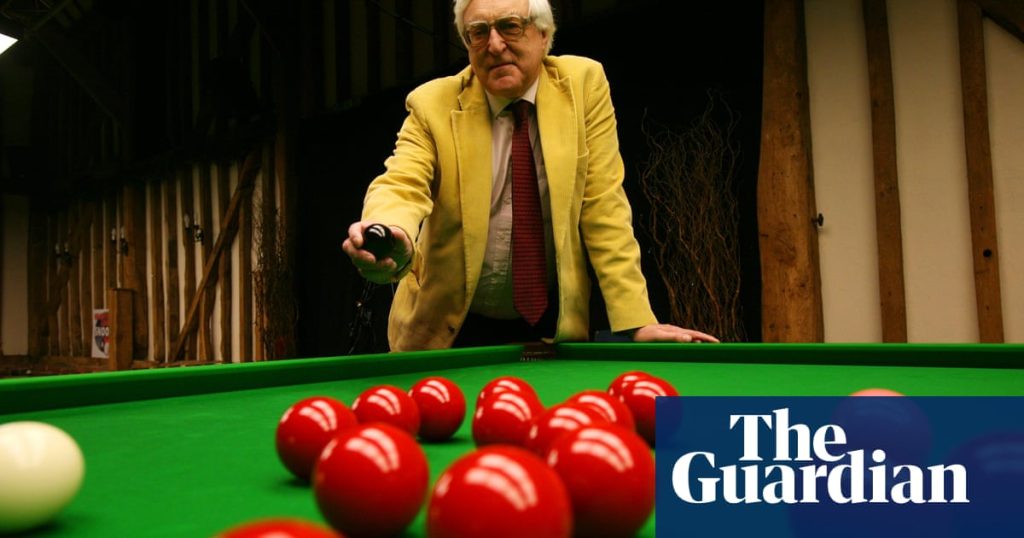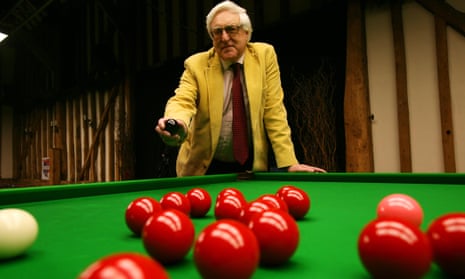Clive Everton obituary


Clive Everton obituary
Television commentator and the moral conscience of snooker through his campaigning journalism on the sport
Clive Everton, who has died aged 87, was known to millions worldwide as the calm, authoritative voice of televised snooker, but of even greater importance was his work as a campaigning journalist for better governance of the game.
Through his editing of the magazine Snooker Scene for 50 years, as well as his writing for the Guardian and other newspapers, Clive was engaged in a near-constant battle with snooker’s governing bodies as, he wrote in his 2007 memoir Black Farce and Cue Ball Wizards, they “frittered away its potentialities through incompetence, mismanagement and worse”.
In his role as the game’s moral conscience, Clive was to have 20 court cases with snooker’s authorities over the decades, all of which he won. He believed, however, that this persistence later affected the commentary career for which he became best known and loved.
He began commentating while still a competitive snooker player in the second half of the 1970s, for regional ITV companies. After winning the 1977 national pairs title alongside Roger Bales, Clive joined the BBC on its coverage of the 1978 World Championship from the Crucible in Sheffield.
As a commentator, Clive was formal in style, always referring to players by their surname, and maintaining professional distance, even during the snooker boom of the 80s, when figures such as Steve Davis and Alex Higgins were household names. He used an old-fashioned lip microphone, which he would leave “open” between shots. This would mildly frustrate certain co-commentators, who preferred to chat with each other, but Clive insisted they focused on the action. On occasion, former professional players who were new to commentary would receive the sound advice from Clive that “less is more”.
His own command of the English language was such that he would capture the moment with a few succinct, perfectly chosen words. Following the retirement of “Whispering” Ted Lowe after the 1996 World Championship, Clive’s status as the voice of snooker was cemented.
Yet, despite his popularity with audiences, Clive believed that his clashes with the sport’s governing body, the World Professional Billiards and Snooker Association (WPBSA), led to numerous attempts by the organisation to remove him from his commentary work. In 1985, he was sacked momentarily, only for Jonathan Martin, the BBC’s head of sport, to immediately reinstate him.
“This was far from the last such attempt,” Everton wrote, “and several ignoble hearts must have been gladdened when, in the face of public opinion, I was marginalised virtually to vanishing point in 2009.”
Even so, Clive remained in demand on Sky Sports’ coverage of Premier League Snooker, and in 2013, when ITV returned to snooker, he was hired as their lead commentator, a role he held up to the end of his career at the 2019 Champion of Champions.
Born in Worcester, Clive was the son of Alma and Harold Everton, who had a transport business. The boy’s fascination with cue sports began when his father took him to the plush fauteuils of Leicester Square Hall, then the home of the professional game. There, Clive witnessed his first century break, compiled by Sidney Smith, and he was hooked.
It was accepted wisdom in those days that you needed to master English billiards before you could make it as a snooker player, and Clive played both games whenever he could. In 1952, the fledgling BBC Television showed the final of the British under-16 billiards championship, in which Clive was playing John Lambert, from the womb-like amphitheatre of Burroughes & Watts, Soho Square, on a Saturday afternoon. Clive won the match comfortably, and the winner’s trophy was presented to him by the England cricketer Alec Bedser.
When Clive returned to King’s school, Worcester, there was no praise from the headmaster, who did not consider billiards an honourable pursuit. This hardened Clive’s anti-establishment instincts, which were to stay with him into adulthood, as did his love of billiards. In 1956, he won the British under-19 championship, and in 1960 the Welsh amateur title for the first of five occasions, the last coming in 1999. He reached the final of the English amateur championship five times.
He turned professional as a snooker player in 1981, but was already well into his 40s by then, and had developed an exaggerated playing style following major back surgery that saw him twist into each shot. Nevertheless, he reached a high of 47 in the world rankings in 1983-84, and continued to hold professional status until 1991.

As a youth he also excelled at tennis, and he was good enough to remain part of the Worcestershire team for 13 years. In 1961, during County Week, the inter-county grass court championships, Clive was in a winning pair that beat Mike Sangster two weeks before he reached the semi-finals at Wimbledon.
Aged 19, Clive met Valerie Teasdale while studying at the City of Birmingham College of Commerce; he later got an English degree from Cardiff University. Clive and Valerie married in 1961.
Following a brief period teaching, from 1966 to 1970, Clive edited a magazine called Billiards and Snooker, which was owned by the now defunct Billiards and Snooker Control Council (B&SCC).
Around this period, Clive was also the Birmingham Post’s hockey correspondent and manager of Jonah Barrington, the world No 1 squash player. Needing a sponsor for Jonah’s tour, Clive approached the former BBC Come Dancing and cricket host Peter West and the marketing executive Patrick Nally, who were setting up a sports sponsorship consultancy. They agreed to include squash in their pitch, as well as asking Clive for any other ideas. He suggested hockey and snooker; the latter placing the four best professionals in a league. Peter took this to the BBC, which agreed to show the 1970 final highlights on Grandstand (this became a tournament that evolved by 1975 into the Masters), and Clive put the four players on the front of Billiards and Snooker magazine.
The then B&SCC chairman, Jack Karnehm, was incensed at Clive “giving professionals publicity”, and had him sacked; Clive immediately set up a rival magazine, World Snooker, with the first issue being published just three weeks later, in January 1971. The following year, the B&SCC asked Clive to take on their magazine, its circulation having dropped so low, and the two publications merged to become Snooker Scene, which he edited until 2022, and which I now edit.
Clive continued to investigate and report on the sport’s internal strife and mismanagement in Snooker Scene each month, and at the Guardian, where he was snooker correspondent between 1976 and 2011, while at the weekends his work appeared in the Sunday Times for many years and later in the Independent on Sunday. He also wrote more than 20 books on the sport.
It was of considerable comfort to Clive that he was able to witness professional snooker’s revival in fortunes from late 2009 onwards under the WPBSA chairmanship of Barry Hearn.
By 2017, Clive had made his peace with the organisation, and they in turn inducted him into the World Snooker Hall of Fame. Two years later he was appointed MBE. In 2022, the British Open snooker tournament cup was named the Clive Everton Trophy.
He is survived by Valerie and their five children, Jane, Julie, Kate, Lucy and Dan.
- Snooker
- Television
- Newspapers
- obituaries
Source: https://www.theguardian.com







